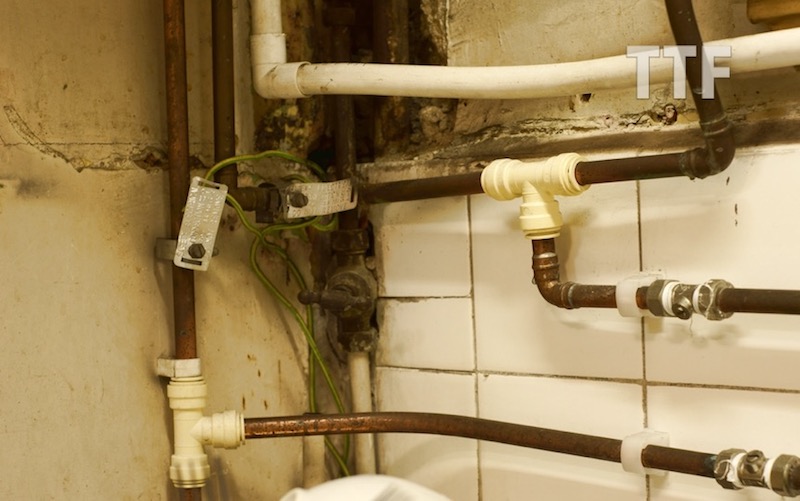
وهو كنلڤستي كچاچتن دالم سيستم ساليرن داڤور، تاندس سباڬاي لالوان سبارن ۏيروس
A paper published by Michael Gormley et al on the 23rdof March 2020 spoke of risks associated with bathrooms and kitchens in the airborne transmission of viruses such as severe acute respiratory syndrome coronavirus 2 (SARS-CoV-2), which causes the coronavirus disease 2019 (Covid-19).
According to the author, the potential for a substantial viral load within the wastewater plumbing system (and therefore the main sewer system), in combination with the potential for airborne transmission due to aerosolisation of the virus, calls for wastewater plumbing systems to be considered as a potential transmission pathway for Covid-19.
Meanwhile, the Malaysian Ministry of Environment has announced that it would conduct a comprehensive study of the risk of Covid-19 to determine whether the virus can spread through the sewerage system.
In a statement, its Minister, Datuk Tuan Ibrahim Tuan Man, said his ministry is expected to work on the study with Universiti Teknologi Malaysia (UTM) and the Delft University of Technology (TU Delft) in the Netherlands next week.

A paper published by Michael Gormley et al on the 23rdof March 2020 spoke of risks associated with bathrooms and kitchens in the airborne transmission of viruses such as severe acute respiratory syndrome coronavirus 2 (SARS-CoV-2), which causes the coronavirus disease 2019 (Covid-19).
According to the paper, WHO had in 2003 published a final report on the super-spreading of SARS within a housing block in Hong Kong.
The author wrote:
“The 50-storey building had 342 confirmed cases of SARS and 42 deaths. The report identified defects in the wastewater plumbing system as a transmission mode within the building, which facilitated the transport of “virus laden droplets” through empty U-bends in bathrooms. This airborne transmission route was aided by bathroom extract ventilation, which drew contaminated air into the room. Since then, our research group has been investigating mechanisms of cross transmission, improvements in system design, and innovations in system monitoring, including confirmation of the wastewater plumbing system as a reservoir for pathogens.”
Michael Gormley et al recommended the following as steps to be taken to ensure that transmission through the wastewater plumbing system is minimised:
1. do not ignore unexplained foul smells in bathrooms, kitchens, or wash areas
2. make sure that all water appliances in bathrooms and kitchens are fitted with a functioning U-bend
3. to prevent the loss of the water trap seal within a U-bend, open a tap on all water appliances for at least 5 s twice a day (morning and evening) paying special attention to floor drains in bathrooms and wet rooms
4. if the wastewater pipework from an appliance appears to be disconnected or open, seal it immediately (ie, use an elastic rubber glove to cover the end; a plastic bag and some tape will suffice, ensuring the bag has no holes
5. if there appears to be any crack or leak in pipework, seal with tape or glue; and
6. continuously monitor whole system performance (for large or tall buildings)
According to the author, the potential for a substantial viral load within the wastewater plumbing system (and therefore the main sewer system), in combination with the potential for airborne transmission due to aerosolisation of the virus, calls for wastewater plumbing systems to be considered as a potential transmission pathway for Covid-19.
Meanwhile, the Malaysian Ministry of Environment has announced that it would conduct a comprehensive study of the risk of Covid-19 to determine whether the virus can spread through the sewerage system.
In a statement, its Minister, Datuk Tuan Ibrahim Tuan Man, said his ministry is expected to work on the study with Universiti Teknologi Malaysia (UTM) and the Delft University of Technology (TU Delft) in the Netherlands next week.
“The ministry is aware of the scientific developments on the Covid-19 pandemic, so the ministry through the National Water Services Commission, National Hydraulic Research Institute of Malaysia and the Indah Water Konsortium Sdn Bhd will conduct a detailed study to find out if the genetic material of the Covid-19 virus can live and reproduce in the public sewerage system.
“This study will also determine if sewage samples in the sewerage system can be indicative of the presence of Covid-19 patients in a particular area,” Ibrahim was quoted as saying.
THE THIRD FORCE



